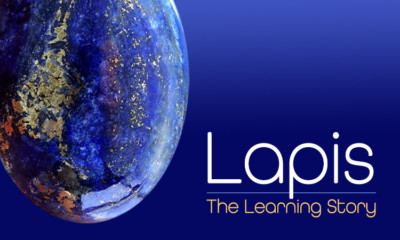What Is Lapis?
 LAPIS: THE LEARNING STORY features diverse articles reflecting the living pedagogical narrative of Maitripa College, which is a completely unique blend of traditional Tibetan Buddhist and Western approaches to teaching and learning. In Tibetan culture, and many others, lapis lazuli is considered a most precious stone, often even treasured as more valuable than diamonds. Traditionally, lapis has always been associated with spiritual attainment, honor, vision, the sea, the sky, wisdom, and truth. Among Tibetans and many others, its deep blue color has long been associated with healing. Aligning the mission of Maitripa College with these qualities, we chose the name Lapis for this space in the Maitripa mandala. Please explore here for glimpses into the unique teaching, learning, and practice that is flourishing in the programs and community at Maitripa College.
LAPIS: THE LEARNING STORY features diverse articles reflecting the living pedagogical narrative of Maitripa College, which is a completely unique blend of traditional Tibetan Buddhist and Western approaches to teaching and learning. In Tibetan culture, and many others, lapis lazuli is considered a most precious stone, often even treasured as more valuable than diamonds. Traditionally, lapis has always been associated with spiritual attainment, honor, vision, the sea, the sky, wisdom, and truth. Among Tibetans and many others, its deep blue color has long been associated with healing. Aligning the mission of Maitripa College with these qualities, we chose the name Lapis for this space in the Maitripa mandala. Please explore here for glimpses into the unique teaching, learning, and practice that is flourishing in the programs and community at Maitripa College.
Lapis Articles
Compassionately Present with Grief as a Buddhist Chaplain by Leigh Miller, PhD
(Spring 2024)
(Spring 2024)
… These were the gifts of grief … And yet, the experience has also deepened my capacity to touch grief–my own, and others’ –in my clinical work as a Chaplain … >READ IN FULL
The Hardest Teaching: An Attempt at Clarity from a Muddy Mind (Reflections on the Passing of our Teacher) by Namdrol Miranda Adams (posted May 2023)
Heartfelt reflections on the life and passing of Lama Zopa Rinpoche >READ IN FULL
Advice to Maitripa Graduates: Dream Beautiful Things Infinitely by Yangsi Rinpoche. Excerpted from Rinpoche’s Commencement Address to the Maitripa College Class of 2022 (Posted October 2022)
To this year’s graduates: I imagine that when you were growing up, you could not imagine that you would come to such a strange place as this college, and then somehow here you are…we call that karma. Nothing is random. Nothing is an accident. My life is also like that! Somehow we all ended up on this journey of study, meditation, and service. And I’m sure there have been lots of questions.. And lots of doubt. Regardless, nothing has held you back. You have really trusted in your own heart to take this journey… >READ IN FULL
Contemplative Practice Is the Heart of Spiritual Formation by Leigh Miller, PhD (Lapis Post: August 9, 2022)
The first time I responded as a Chaplain to a Code Blue (when someone’s heart and/or breathing has stopped) in the Emergency Department of an urban hospital, I became the spiritual caregiver to a young man whose father was undergoing multiple rounds of chest compressions and cardiac arrest…Years of academic and administrative training and leadership prompted conditioned habits of competency: be informed, know what to do or find an authoritative source to rely on, have a plan or at least a clear goal for next steps of action…Panic arose as I realized I was fairly uninformed about how Emergency Departments operate, what the chaplain’s role is there, or how spiritual care in urgent moments of crisis and possible imminent death was “supposed to” look. >READ IN FULL
Movement Chaplaincy: Exploring Emergent Spaces for Spiritual Care on the Frontlines of Social Justice (Lapis Post: August 25, 2021)
Increasing awareness of the impacts and pervasiveness of concurrent pandemics in the United States is leading or forcing many into collective grief as well as a need to act. For some, this means becoming an activist, but others find that spiritual grounding and vision fortifies them to skillfully support persons in social justice movements. This article describes an emergent new space for serving others with the arts and skills of spiritual care: Movement Chaplaincy. >READ IN FULL
Stories From a Precious Time ~ In Honor of the 86th Birthday of His Holiness the 14th Dalai Lama of Tibet (Lapis Post: July 6, 2021)
In honor of the 86th birthday of the embodiment of compassion in human form, His Holiness the 14th Dalai Lama of Tibet, in this Lapis post the core faculty of Maitripa College offer stories of moments with His Holiness from their own experience. We rejoice in our fortune to be alive at this precious time, we dedicate our positive actions to the fulfillment of the good works of His Holiness, and we pray for his continued health, happiness, and long life. >READ IN FULL
“Responding to the Environmental Crisis: Climate Activism from a Buddhist Perspective” by Yangsi Rinpoche
In this edited talk given by Yangsi Rinpoche earlier this year, gain insight into a unique perspective about how we can balance our growing awareness of the crisis in our environment with action to bring about positive change by putting our minds at the center of the solution. In this post, Yangsi Rinpoche brings traditional Tibetan Buddhist wisdom to bear on a modern problem in a completely unique way. Check out this latest Lapis post for a taste of how to make your practice your life… >READ IN FULL
“Insights and Foundations: Buddhist Chaplaincy Training in the Pandemic ~ A Story from Maitripa College Students” by Leigh Miller, PhD
The past year (2020) has been a year filled with challenges and crises like no other in recent history. In this Lapis post, catch a glimpse of how some aspiring chaplain/Maitripa College students were able to demonstrate resilience and agility within the unique situation of the pandemic and persevere in their education as a caregivers in local hospitals. Their stories will inspire and uplift… >READ IN FULL
“Lineage: Love, Transformation, Action” by Namdrol Miranda Adams
Namdrol Miranda Adams, Dean of Education and one of the founders of Maitripa College, offers a deeply personal reflection on the importance and function of “lineage” in our practice, study, and lives. >READ IN FULL
“When the Tree Bears Fruit” by Leigh Miller, PhD
Leigh Miller, PhD, Director of Programs at Maitripa College, chats with Mark Weidenaar, an advanced-standing MDiv student at Maitripa College, about his experience of Clinical Pastoral Education (CPE) and how his education at Maitripa College and the practice that has evolved from it facilitates his ability to serve others in the world. >READ IN FULL
“Mind Protection, Mantra Practice” by Dr. Jane Robinett, Maitripa College Student of Buddhist Studies
For most of March, I found myself stunned by the pandemic and overwhelmed by the steadily rising numbers. Swamped by the flood of suffering, I found it very difficult to concentrate on meditation. My ability to focus wobbled like a poorly made gyroscope. I found this very disheartening. To recover my ability to meditate… >READ IN FULL
May Word of the Month: Bodhicitta
The Word of the Month by Maitripa College Professor Bill Magee (one of world’s foremost teachers and translators of classical Tibetan language and Tibetan Buddhist texts) is for those interested in fun facts about Sanskrit, Tibetan, and English words in Buddhism. The word this month is bodhicitta/ >READ IN FULL
Lapis: A Stone by Any Other Name? (A Tibetan Translation Story)
Michael Ium graduated from the MA program at Maitripa College in 2014 and is currently a doctoral candidate in the department of Religious Studies at the University of California, Santa Barbara. His doctoral research is focused on the early history of Ganden Monastery, the home of Tsongkhapa’s nascent Geluk tradition and the mother of all Geluk religious centers who would come afterwards (including Maitripa College!). In this article, Michael explores the joys and challenges of becoming a Tibetan translator. >READ IN FULL
April Word of the Month: Buddha
This space will present The Word of the Month for those interested in fun facts about Sanskrit, Tibetan, and English words in Buddhism. As a translator, I deal with these words as commonplace every day, so it is good to step back now and then to reflect on their meaning and usage. The first word we encounter is buddha. >READ IN FULL
The Degree Program at Maitripa College Helped Deepen the Meaning and Purpose of My Life
Jane Sellers was among the first wave of students who moved to Portland in 2005 and 2006 to take part in an educational experiment: a new advanced program of Buddhist studies being developed under the guidance of Yangsi Rinpoche called Maitripa College. Jane graduated with a Master of Arts in Buddhist Studies from Maitripa in 2009. She moved back to Colorado in 2014 where she served from 2016-2019 as the study group coordinator and then center director (and one of the FPMT teachers) at Lama Yeshe House, Lama Zopa Rinpoche’s center in Denver. Recently retired from her career as a physician assistant, Jane talked to Communications Coordinator Kate Macdonald about the Buddhist path, the benefit of Maitripa’s degree program, the role of travel and retreat in her life, and more. >READ IN FULL
Exploring Secular Ethics: A Maitripa College–Portland State University Connection
“Learning to be non-reactive would be my fundamental proposition for you. You are all going to be working on a team, working in groups, communicating over email, and so on. The word ‘compassion’ sounds religious, but ‘non-reactive’ actually means the same thing.” This was the message from Maitripa College President Yangsi Rinpoche to graduate students in Dr. Kevin Kecskes’ Administrative Ethics and Behavior course at Portland State University in early 2020. >READ IN FULL
Practicing the Path: The Roots of Maitripa College by Namdrol Miranda Adams
In the first months of the year 2000, about 50 students from all corners of the globe huddled in the meditation hall at Tushita Meditation Centre in Dharamsala, India. We were all in various states of fear, joy, and expectation, having untethered ourselves from our daily lives in other places for the next two months to come to India, receive daily teachings, and be led in meditation and practice in retreat on the lamrim, the graduated path to enlightenment, by our teacher Yangsi Rinpoche. >READ IN FULL
A Student’s Voice: Learning to Embrace Tradition, Lineage, and Ritual on the Path by Andrew Hughes
Five years ago while I living in Austin, Texas, well before I had any idea that I might attend school at Maitripa College, my partner and I went to a Buddhist center for a meditation session. The center was relatively small, with room for about 20 people. Immediately upon entering, the meditation hall felt foreign. The various altars, the images of the gurus, the bright golds, yellows and reds of the decorative cloths—I did not know what to make of it; the culturally foreign aspects of the experience felt distracting and unnecessary. >READ IN FULL
Frequently Asked Questions from Applicants to Maitripa College by Namdrol Miranda Adams
In the nearly fifteen years that I have been in dialogue with applicants of Maitripa College programs, a few main questions have arisen over and over. These questions are deeply felt and important, and, since they have arisen from many voices over the years, we have decided to focus this conversation around them. >READ IN FULL
Translation for the Sake of Self and Others by José Ignacio Cabezón, PhD
Our motivation for learning Tibetan, or learning to translate a Tibetan work into English, tends to be focused on the end result—the way that our labors fulfill the goals of others. But there is another aspect of working with Tibetan texts that is important, which lies in recognizing the value of engaging with them for the purpose of advancing our own development. >READ IN FULL


